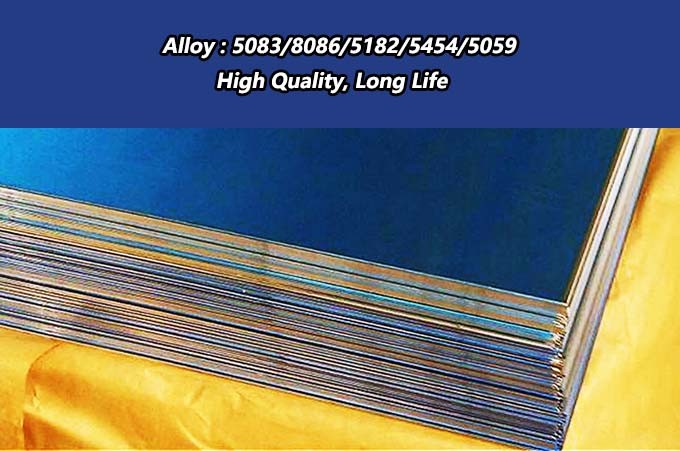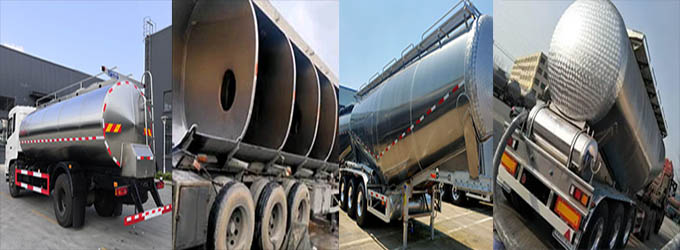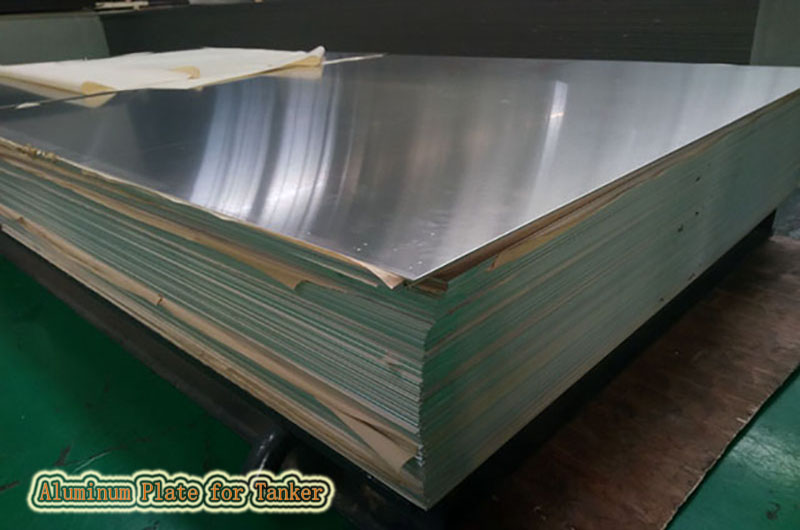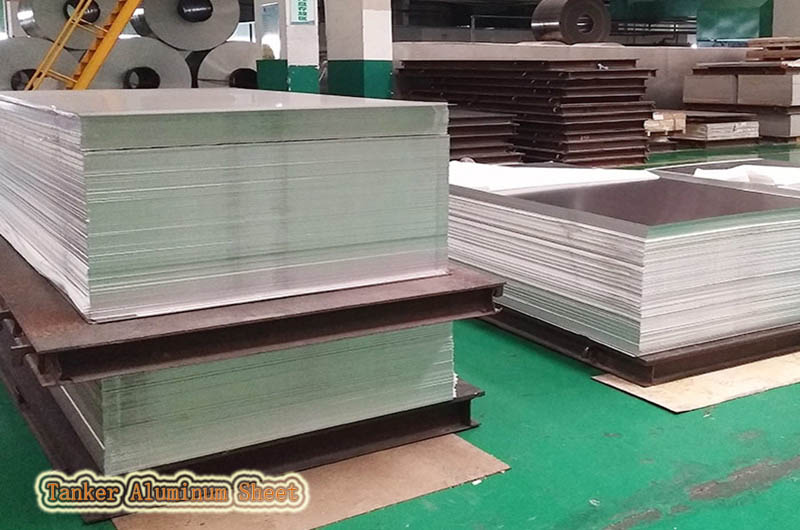Aluminum Plate for Tanker
We have a strict quality control system, certified by the international quality standard ISO 9001, to ensure that the Aluminum Plate for Tanker meets the required standards and specifications.


What is a Tanker Aluminum Plate?
"Tanker Aluminum Plate" means aluminum plates specially designed and used in the construction or maintenance of tank trucks. Tank trucks are used to transport liquids or bulk materials. The tanks or compartments of these vehicles often require strong and corrosion-resistant materials, such as aluminum plates, to ensure the safety and durability of the tank trucks.
In short, the aluminum plate for tank trucks refers to the aluminum plates that play a key role in the tank structure of the tank truck vehicle, making it suitable for transporting various liquids or bulk materials.
Aluminum Sheets are commonly used in the construction of tanker trailers for transporting various liquids, including gasoline, diesel, and chemicals. Aluminum is preferred for this application because of its high strength-to-weight ratio, which improves payload capacity and fuel efficiency.

In addition to high strength and corrosion resistance, the aluminum plates used to build tankers can also be treated with various surface coatings to enhance their durability and wear resistance. These coatings may include anodizing, powder coating, or other types of surface treatments.
Aluminum Sheets used in tanker structures must be able to withstand the harsh conditions of shipping, handling, and exposure to a variety of chemicals and elements. As such, they are designed to be extremely durable, corrosion-resistant, and capable of withstanding high levels of pressure and impact.
Why Choose Aluminum as the Material for Tank Trucks?
Currently, there are three commonly used tank materials for tank trucks, namely carbon steel, stainless steel, and aluminum alloy.
There are several important reasons for choosing aluminum as a material for tank trucks:
Reason 1: The corrosion resistance of aluminum sheets helps prevent leaks and structural damage to tank trucks over time.
The surface of aluminum forms a natural oxide layer, which provides excellent corrosion resistance. This is critical when transporting liquids or materials that may be corrosive, acidic, or otherwise reactive.
Reason 2: Aluminum is much lighter than steel
The weight reduction helps improve fuel efficiency, increase payload capacity, and reduce wear and tear on vehicle components. Tank trucks need to carry a lot of cargo, and lighter vehicles can carry more cargo.
Reason 3: Aluminum has good strength and durability
Although aluminum is lighter than steel, it still offers impressive strength and durability. It can withstand the stresses and pressures associated with transporting liquids or bulk materials, making it a reliable choice for tank construction.
Reason 4: Aluminum is relatively easy to process
Aluminum is suitable for the complex shapes and structures required for tank construction. It can create custom tank designs through molding, welding, and forming.
Reason 5: Aluminum has excellent thermal conductivity properties
Effective temperature control can be carried out inside the tank, which is very important when transporting temperature-sensitive goods such as food or chemicals.
Reason 6: Aluminum is highly recyclable
The choice of aluminum alloy as tank truck material is in line with environmental sustainability goals. Using recycled aluminum in tanker construction reduces the environmental impact of the manufacturing process and lowers the overall carbon footprint of the tanker.
Reason 7: Long life
Long lifespan: Aluminum cans have a long lifespan and can withstand harsh environmental conditions. They are less susceptible to rust and degradation than steel tanks, extending the life of the tanker.
Reason 8: Many safety regulations and industry standards require the selection of aluminum alloys as tank truck materials
Many safety regulations and industry standards require the use of aluminum in certain types of tank cars, especially when transporting certain hazardous materials. Aluminum's corrosion resistance and strength make it the first choice to comply with these regulations.
Aluminum's combination of corrosion resistance, strength, lightweight properties, and ease of manufacturing makes it an excellent choice for building tankers that are efficient, durable, and capable of safely transporting a variety of materials.
What are the Advantages of using an Aluminum Plate for Tanker?
The application of aluminum plates to tank truck bodies can reduce the weight of each vehicle by 3-5 tons, thereby reducing the inertia of the vehicle body, improving transportation efficiency while also achieving energy saving and emission reduction, and has obvious advantages in traffic safety.
- Improved fuel efficiency: Lighter tank trucks require less fuel to transport the same amount of cargo, resulting in improved fuel efficiency and lower operating costs.
- Increased payload capacity: The vehicle is lighter and can transport more cargo within legal weight limits, maximizing the tanker’s payload capacity.
- High resale value: Tankers with aluminum tanks tend to have a higher resale value compared to steel tanks. This is due to the fact that aluminum cans last longer and are less expensive to maintain.
- Resistant to stress cracking: Aluminum is less prone to stress cracking than some other materials used in tank construction, making it a reliable choice for tanks subject to stress and pressure fluctuations.
- Aesthetic Appearance: Aluminum tanks often have a sleek and modern appearance, which is important for companies that want their fleet to have a visually appealing and professional image.
Aluminum vs. Steel for Tank Truck
1. Aluminum is much lighter than steel, thus reducing the overall weight of the tanker
Compared with carbon steel tanks, aluminum alloy tanks are about 40% lighter with the same volume.
According to a relevant research report by the European Aluminum Research Association, every 1 ton of vehicle weight can save 0.6L of gasoline per 100km. If an aluminum alloy tank truck is 5t lighter than a similar steel tank truck. Calculated based on 120, 000 kilometers per year and half of the no-load mileage, at least 1, 800L of fuel can be saved, which can save 9, 720 yuan/year.
2 Aluminum can trucks have good electrical conductivity and energy absorption properties, making them safer.
The weight of the aluminum tank truck body is greatly reduced, so the center of gravity of the tank truck is also reduced accordingly, thereby reducing the possibility of the tank truck rolling over and improving its driving performance.
When a tanker collides, because aluminum alloy has good electrical conductivity, very little static electricity accumulates In the tank, so sparks will not be generated, leading to explosions and other accidents.
3. Aluminum for Tank Truck has a higher recycling value
After the tank truck was forced to be scrapped, the aluminum alloy tank body was not seriously damaged, and the recycling value of the tank body was more than 85% of the original aluminum. In other words, if a tank uses 5 tons of aluminum, the cost of recycling the tank will be at least 80, 000 yuan.
In summary, the corrosion resistance, lightweight design, strength, ease of fabrication, and other advantages of using aluminum plates on tank trucks make it the first choice for many industries involved in transporting liquids or bulk materials.
What Alloy is used for Tank Truck Aluminum Plates?
The specific choice of alloy for a tanker will depend on specific application requirements, such as the type of cargo being transported and the environmental conditions in which the tanker will operate.
The main alloy grades suitable for tank car bodies include:
- 5052 aluminum plate
- 5083 aluminum plate
- 5754 aluminum plate
- 5182 aluminum plate
- 5059 aluminum plate
- 5454 aluminum plate
| Property | Typical Specifications for Tank Truck Aluminum Plates |
|---|---|
| Length | Generally within 12.5 meters |
| Width | Typically less than 2.2 meters |
| Thickness | Commonly 5, 6, 7, 8 mm, or as needed |
| Number of Plates | Typically 4-6 plates welded together for a complete tank body |
| Tank Body Thickness | Minimum 5 mm; Often 7 mm for oil tankers |
| Baffle Requirements | Typically, baffles every 1.5 meters; no more than 1.7 meters apart |
-
5182 Aluminum Plate for Tanker
Specifically designed for tankers, our 5182 aluminum plate offers excellent corrosion resistance and high strength for reliable leak and splash protection.
-
5083 Aluminum Plate for Tanker
Our products meet the quality standards and complete specifications, choosing the right Tanker Aluminum Plate will not deteriorate or cause pollution in harsh environments.
-
5454 Aluminum Plate for Tankers
To ensure the safety and reliability of these tankers, the choice of materials is of utmost importance. Among the various materials available, 5454 aluminum plate has emerged as a popular choice due to its exceptional properties and benefits.
-
5754 Aluminum Plate for Tankers
5754 Aluminum Plate for Tankers Its light weight, corrosion resistance, durability and formability make it an ideal material for all types of tankers.
-
5059 Aluminum Plate for Tankers
The use of 5059 Tanker aluminum plates may become more widespread in tanker construction, contributing to a safer, more cost-effective and environmentally friendly transportation industry.

Tanker Aluminum Plate Data
| Alloy | Tensile Strength (MPa) |
|---|---|
| 5083 Tanker Aluminum Plate | 275-350 |
| 5454 Tanker Aluminum Plate | 275-345 |
| 5086 Tanker Aluminum Plate | 240-310 |
| Alloy | Yield Strength (MPa) |
|---|---|
| 5083 Tanker Aluminum Plate | 125-200 |
| 5454 Tanker Aluminum Plate | 125-200 |
| 5086 Tanker Aluminum Plate | 95-150 |
| Alloy | Typical Hardness (Brinell) |
|---|---|
| 5083 Tanker Aluminum Plate | 75-100 |
| 5454 Tanker Aluminum Plate | 80-100 |
| 5086 Tanker Aluminum Plate | 75-100 |
Which Structures of Tank Trucks use Aluminum?
The body of most tank trucks is composed of two major parts: the tank body and the chassis.
Tankers are large cargo ships used to transport liquids and gases such as oil, chemicals and liquefied natural gas. Aluminum is commonly used in the construction of tankers due to its high strength, good corrosion resistance and light weight. Here are some common parts of an aluminum tank truck:
- Aluminum Plate for Tank Body
- Aluminum Plate for Tank Baffle
- Tanker Lid and Cover
- Frames and Supports
- Valves and Piping
-
Aluminum Plate for Tanker Body
Tanker Body complies with various regulations, standards, and certifications related to safety, structural integrity, leak prevention, and cargo handling.
-
Aluminum Plate for Tankers Baffle
Haomei Aluminum provides the raw materials of Tankers Baffle for many Tankers. It has rich experience in the production of aluminum plates and customized sizes.
-
Aluminum Plate for Tankers Bulkhead
Aluminum Plate for Tankers Bulkhead helps improve fuel efficiency of tanker shipping, is long-lasting and recyclable. The adoption of aluminum panels for tanker bulkheads is driven by both economic and environmental factors.
-
Aluminum Plate for Tanker Head
Aluminum Plate for Tanker Head is not only durable, but also efficient, safe and environmentally responsible.
It is important to note that specific tank truck design and construction may vary depending on cargo type, transportation needs, and regulatory standards. Therefore, in tank truck manufacturing, suitable aluminum alloy materials are selected according to specific requirements and ensure that they meet structural strength, corrosion resistance, and other performance requirements.
Types of Tanker Aluminum Plate
The type of environment inside a tanker can vary greatly depending on the contents being transported. The specific requirements for selecting aluminum plates for tank trucks vary depending on the environment and cargo type.
The following are some common environmental types in tank trucks and the corresponding requirements for selecting aluminum plates:
| Aluminum Plate | Environment / Cargo |
|---|---|
| 5083 Tanker Aluminum Plate | Transporting chemicals or corrosive substances |
| 5454 Tanker Aluminum Plate | |
| 5083 Tanker Aluminum Plate | Saltwater (sea tanker) |
| 5083 Tanker Aluminum Plate | Dry bulk materials |
| 5052 Tanker Aluminum Plate | Safety and Health |
| 5083 Tanker Aluminum Plate | |
| 5059 Tanker Aluminum Plate | Transport of dangerous goods |
| 5182 Tanker Aluminum Plate | Does not care about corrosive environment |
The selection of the appropriate aluminum alloy in each case depends on the specific requirements and considerations associated with the given environment and cargo type. When selecting aluminum plates for tank trucks, be sure to adhere to safety and regulatory standards.
Tank Truck Aluminum Plate Selection Guide
When selecting aluminum plates for tank trucks, there are several key factors to consider to ensure the safety, performance, and compliance of your tank truck. Here are the key factors to keep in mind:
- Cargo type
- Strength requirements
- Consider corrosion resistance
- Consider solderability
- Pay attention to the temperature
- food safety standards
- Must comply with local, national, and international regulations and standards
- surface finish
- Whether the coating is required
- Maintenance requirements
- cost considerations
Ultimately, the selection of tank truck aluminum plates should be based on a comprehensive evaluation of these factors to ensure the reliability, safety, and longevity of the tank.
The choice of tank truck aluminum plate can vary depending on the specific use of the tank truck. Below is a list of different aluminum plates commonly used on tank trucks. According to its applicability to various types of tank trucks:
| Tank Truck Type | Recommended Aluminum |
|---|---|
| LNG Tank Trucks | 5083 Aluminum Plate |
| Oil Tank Trucks | 5454 Aluminum Plate |
| Fuel Tank Trucks | 5052 Aluminum Plate |
| Powder Tank Trucks | 5083 Aluminum Plate |
| Chemical Tank Trucks | 5083 Aluminum Plate |
| Cement Tanker | 5454 Aluminum Plate |
| Milk Tank Trucks | 5083 Aluminum Plate |
| Food-Grade Tank Trucks | 5083 Aluminum Plate |
| Propane Tank Trucks | 5083 Aluminum Plate |
| Aluminum Tanker Trailer | Varies:5052, 5454, 5083 |
1. LNG Tank Trucks
Requirements: LNG tank trucks require aluminum panels with excellent low-temperature performance and high structural integrity.
Suitable alloys: Alloy 5083 or Alloy 5454. These alloys have good low-temperature properties and corrosion resistance.
2. Oil Tank Trucks
Shipped goods: various petroleum products.
Requirements: Oil Tank Trucks should prioritize corrosion resistance and structural strength.
Suitable alloys: Alloy 5454 or Alloy 5083. These alloys have excellent corrosion resistance.
3. Fuel Tank Trucks
Shipping Goods: Gasoline, diesel, or other petroleum products.
Fuel Tank Trucks can transport a variety of fuels, including gasoline and diesel. Aluminum alloy 5052 is a common choice due to its corrosion resistance and good weldability. It works with most types of fuel.
4. Powder Tank Trucks
Shipping Cargo: Transporting dry bulk materials such as grain, flour, or cement.
The choice of aluminum alloy for powder tank trucks depends on the type of powder being transported. For general-purpose applications, alloy 5083 is often used due to its strength and corrosion resistance.
5. Chemical Tank Trucks
Shipment: Corrosive chemicals.
Requirements: The panels must have excellent corrosion resistance and safety compliance.
Suitable alloys: Alloy 5083 or Alloy 5454, known for their corrosion resistance.
6. Cement Tanker
Requirements: The panels should be strong, durable, and able to withstand the wear and tear of the cargo.
5454 aluminum alloy is often used in cement tank trucks because of its corrosion resistance and strength. However, specialized coatings or linings can also be used to protect the material from wear.
7. Milk Tank Trucks
Shipping goods: milk and other dairy products.
Requirements: Aluminum plates must meet strict hygiene and food safety standards.
Food-grade tank trucks require aluminum panels that meet strict hygiene standards. Alloy 5083 is often used and the tanks may have special linings or coatings to ensure food safety.
8. Food-Grade Tank Trucks
Delivery of goods: various food items.
Requirements: Aluminum Plates must meet food safety standards and be easy to clean.
Similar to milk tankers, food-grade tankers require aluminum panels that meet food safety standards. Alloy 5083 is a common choice and the tanks must meet strict cleaning and sanitation requirements.
9. Propane Tank Trucks
Shipping Goods: Propane Gas.
Requirements: The Aluminum Plate must be sturdy and suitable for pressurized propane transport.
Suitable alloy: Alloy 5052 or Alloy 5083, depending on structural requirements.
Aluminum alloy 5083 is commonly used in propane tankers due to its good strength and corrosion resistance. It is important to comply with safety regulations for propane transportation.
10. Aluminum Tanker Trailer
Cargo shipped: Varies based on application (e.g. chemicals, dry bulk).
Similar to Tank Trucks, alloy selection for Aluminum Tanker Trailers depends on specific cargo and regional regulations. Alloys such as 5052, 5454, and 5083 may be suitable, but customization may be required.
When selecting aluminum plates for tank trucks, it is critical to work closely with manufacturers, engineers, and regulatory agencies to ensure that the selected alloy and structure meet the safety, environmental, and performance standards of the specific application. Additionally, proper maintenance and inspection are critical to ensuring the long-term integrity of your tanker truck.
What Problems are often Encountered During the use of Tank Truck Aluminum Plates?
Tank truck aluminum plates will encounter some problems during use, which may affect the performance, safety, and life of the tank. Some common questions and challenges include:
1. Corrosion
Corrosion is a significant issue, especially when tanks contain corrosive or acidic materials. Over time, aluminum corrodes, leading to structural weakening and potential leaks.
2.Welding failure
Welding is critical to tank construction and welding failure can lead to leaks and structural problems. Issues such as lack of penetration, porosity, and improper welding techniques can compromise the integrity of the tank.
3. Cracking
Aluminum is prone to stress corrosion cracking, especially when exposed to high-stress levels and exposure to corrosive substances. This may cause unexpected malfunctions and leaks.
4. Fatigue
Due to the nature of transportation, tank trucks may experience loading cycles. Over time, this cyclic loading can cause fatigue cracks in the aluminum plates and welds. Proper design, maintenance, and inspection are necessary to prevent fatigue-related problems.
5. Improper maintenance
Improper maintenance can lead to problems such as residue buildup or corrosion within the tank, affecting the quality and safety of subsequent loads.
6. Pollution
If the tank is used to transport food-grade or beverage products, contamination can be a serious problem. Proper cleaning and sanitation practices must be followed to prevent cargo contamination.
7. Extreme temperatures
If the tank is used to transport materials at extreme temperatures, such as cryogenic liquefied gases or high-temperature liquids, aluminum panels must be selected and constructed to withstand these conditions without problems such as cracking or deformation.
8. Regulatory Compliance
Failure to comply with safety and environmental regulations can result in legal and operational issues. It is critical to ensure that the storage tank meets all relevant regulatory requirements.
9. Damage during loading/unloading
Improper handling during loading and unloading can cause physical damage to the tank, including dents and scratches, which can reduce structural integrity and lead to corrosion over time.
10. Material Compatibility
Using the wrong aluminum alloy or construction material for a specific cargo can cause chemical reactions or incompatibility issues that could affect the cargo or the tank itself.
11. Weight limit
Exceeding the weight limits set by shipping regulations may result in legal issues and safety issues. The use of lightweight aluminum is still subject to legal weight limits.
12. Environmental impact
A spill or leak from a tanker truck can have serious consequences for the environment. Proper containment systems and leak prevention measures are critical to minimizing these risks.
To mitigate these problems, it is important to follow best practices in tank design, construction, and maintenance. Regular inspection and maintenance procedures should be established to allow early detection and resolution of problems. Additionally, compliance with safety and regulatory standards is critical to ensuring the safe and compliant operation of tank trucks.
Frequently Asked Questions about Tank Truck Aluminum Plate?
1. How can I prevent corrosion in tank truck aluminum plates?
Corrosion can be prevented by selecting corrosion-resistant alloys, applying appropriate coatings, and implementing proper maintenance and cleaning practices.
2. What maintenance practices are essential for tank truck aluminum plates?
Regular inspections, cleaning, and maintenance routines are critical. This includes checking for corrosion, inspecting welds, and ensuring proper sanitation for food-grade cargoes.
3. Can tank truck aluminum plates be used for transporting hazardous materials?
Yes, aluminum plates can be used for transporting hazardous materials, but the tank design and materials must meet stringent safety and regulatory standards for such materials.
4. Are there weight restrictions for tank truck aluminum plates?
Yes, tank trucks must adhere to legal weight limits. The lightweight nature of aluminum should not result in exceeding these limits.
5. What should I do in case of damage or wear to tank truck aluminum plates?
Damaged or worn aluminum plates should be repaired or replaced promptly to maintain the tank's structural integrity and safety.
6. How do I clean and sanitize tank truck aluminum plates for food-grade cargo?
Cleaning and sanitizing procedures should follow food safety guidelines and may involve thorough rinsing, washing with appropriate detergents, and disinfection.
High-quality Supplier Aluminum Plate for Tanker
Haomei Aluminum suppliers of aluminum plates for tanker construction are able to provide high-quality materials, technical expertise, customization capabilities, reliable delivery and logistics, and excellent customer service.
- Quality Certification: Suppliers certified to international quality standards such as ISO 9001 ensure their products meet the highest quality standards.
- Material Quality: Suppliers use premium aluminum alloys that meet industry standards for strength, corrosion resistance, and other performance characteristics.
- Technical Expertise: Free technical advice and guidance on selecting the appropriate alloy and plate thickness for a specific Tanker construction application.
- Customization Capabilities: Premium suppliers are able to provide custom solutions to meet the unique needs of a particular tanker construction project, including offering a range of thicknesses, widths and lengths.
- Delivery and logistics: ensuring the ability to deliver the aluminum panels to the required locations on time and properly packaged and handled to prevent damage in transit.
The following products may interest you
-
5083 aluminum plate is a non-heat treatable alloy with high strength and corrosion resistance. We offer a wide range of sizes, thicknesses, and specifications at affordable prices to meet customer-specific needs.
-
5083 H32 aluminum plate has excellent corrosion resistance, good weldability, and high strength. The surface of the 5083 h32 Aluminum Plate has no oil spots, no waves, no scratches, no roll marks, and meets the production standards.
-
5083 h116 Aluminum Plate Sheet
5083 H116 aluminum plate is often used in the marine field because of its high low-temperature strength and corrosion resistance, which can extend the service life of the ship. Because of its light weight, it can better increase the ship's speed.
-
5182 aluminum plate, which is a deformed alloy with good corrosion resistance, good weldability, corrosion resistance, medium strength and cold working properties.
-
5182 H19 is a non-heat treatable aluminum alloy with excellent corrosion resistance and ductility, good formability and strength. 5182 aluminum plate is suitable for gas welding, argon arc welding, spot welding, seam welding and other welding, and its welding performance is very good.
-
The strength of 5754 aluminum is higher than that of 5251. 5754 aluminum plate is a high-strength non-heat-treatable alloy and has excellent corrosion resistance, good processability, and weldability.
-
5754 h22 aluminum refers to H22 tempered 5754 alloy. 5754 h22 Annealed to quarter hardness. Generally speaking, 5754 h22 alloy is widely used in welded structures, vehicles, marine applications, etc.
-
The strength of 5454 antirust aluminum is about 20% higher than that of 5052, and its characteristics are roughly the same as that of 5154, but its corrosion resistance is better than that of 5154 in severe environments.

